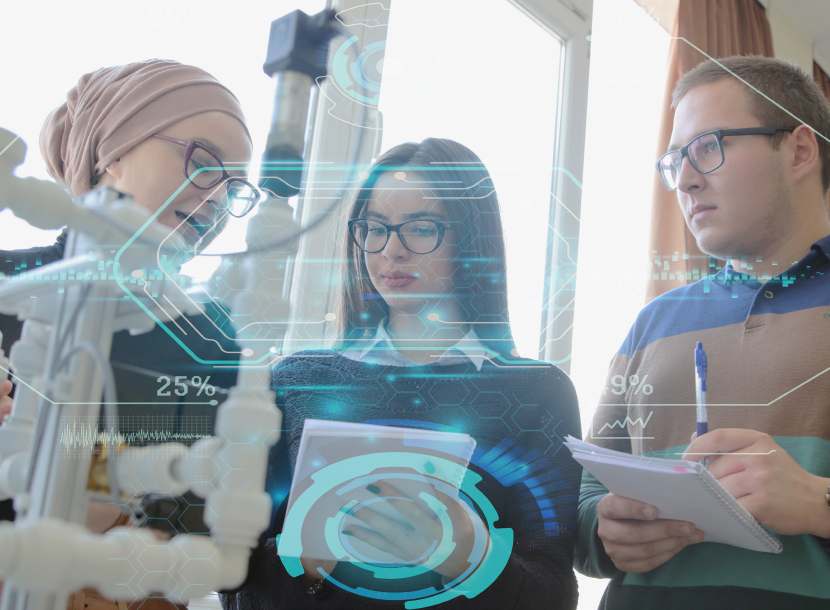FRAUNHOFER’S PERSPECTIVE ON ADVANCED TRAINING

It is easy to agree, in theory, that regular staff training is necessary to encourage growth and enhance productivity. There is also no doubt that a highly trained team provides superior performance in comparison to a team with haphazard training, or worse yet, no training at all. So why do so many companies baulk at the idea of developing a comprehensive, ongoing and sustainable training strategy?
Training can be a polarizing topic. It takes your people off the shop floor, creating staff management headaches. Like rowing against the current, if you stop paddling, you fall back.

Once this happens, it is extremely difficult to catch up. Ceasing training, therefore, is not a viable option, which is why many companies view training as a necessary evil, knowing they need it but begrudging the expense and time it can take to get their people up to speed.
When properly planned, co-ordinated and implemented, training is an ideal way to energize your people and maximise their talent, providing avenues for their personal growth, which they can then use to improve your company.
Approaches to industrial training have grown in leaps and bounds in recent years and Fraunhofer has been at the vanguard of this mentality shift. Gone are the days when students would report to a classroom, sitting all day at desks while a teacher talks at them. This approach worked only with people who were highly motivated to learn. Most training participants are not highly motivated. They often view training either as a waste of time, or as an opportunity to fail, publicly and spectacularly. How then do you change the mindsets of your workers and encourage them to accept a new training regimen?
Innovation as a Training Strategy
Innovation in your factory processes and in your training are the keys to staying ahead of your competition. Fraunhofer, who specialize in bringing innovative solutions to industry, also offer technologically innovative training to help you and your people adopt new technologies, improve on your existing methodologies and most importantly, increase motivation and receptiveness to change.
We know from our experience in pioneering new technologies, that when we implement bold new ideas, we invite interest from other successful innovative companies who are looking for new ways to grow and improve. This presents unique opportunities for collaboration with like-minded companies.
How to Devise a Workable Training Regimen
Start at the top. To achieve cohesive uptake of all training programmes, responsibility for oversight should always start with Executive Management. They are in the best position to know where remedial training is required to address existing issues and to anticipate training needs for innovations that may still be in various stages of planning and therefore, not widely discussed.
Invest time and consideration into planning. This will help you devise a workable training strategy that accomplishes your overall goals and takes your ambitions for the future into account. Your strategy needs to work for your company’s unique requirements and circumstances.
Take a collaborative approach to training. Choose a training provider who has expertise across all aspects of your business. From shop floor to dispatch, from customer services to marketing, using one provider to cover all training needs ensures you have company-wide uniformity and cohesiveness, minimizing the chances for operational conflict between departments. When you are all on the same page, you are helping and supporting each other to get future fit.
Successful training outcomes start with quality professional training. Find an innovative training company who shares your company’s values and understands your unique needs. Ensure they have the resources to do the whole task and not outsource parts of your training program to subsidiaries or strategic allies, because this will undermine your need for cohesion.

Fraunhofer’s Vision
Devising new and exciting technologies and industrial methodologies is meaningless – unless you have the expertise to implement them. It is for this reason that Fraunhofer continue to focus their expert attention on innovative ways and means of training. They have finely developed strategies for translating raw knowledge into shop floor practices. After all, what would be the point of devising masterful innovations if your workforce is unable to follow-through? Finding that meeting point between creativity and practicality can often be an art in itself. It is one that
Fraunhofer has mastered. An example of this is our seminar, ‘Machine Learning and artificial intelligence in production’, where individual learning steps are accompanied by practical, hands-on exercises where participants learn to pre-process data sets, train ML algorithms and evaluate the results, using the knowledge and tools gained during the seminar.
To achieve a seamless switch from traditional techniques to innovative ones is challenging enough, without needing to worry about the impact such changes will make on your workforce. Fraunhofer can help smooth your transitions by helping prepare your workforce for these new challenges, giving you a head-start in implementing your move to innovation. Our ‘Chief Technology Officer’ (CTM) training course is a case in point. The five-day Certificate course presents participants with the skills they will need to fully utilize the technological potential within their company, providing them with the tools they will use to reduce ‘time-to-market’ and streamline development costs.
Helping companies establish innovative cultures has been the cornerstone of Fraunhofer’s work since their inception. Developing continuing education programs to re-educate workforces is a vital part of that vision. Using high-quality knowledge transfer is an innovation that Fraunhofer continues to refine and their work in this area is on the cutting edge of industrial education.
In addition to purpose-built training solutions for innovative companies, Fraunhofer also offers a wide range of seminars, workshops and conferences designed to move companies and personnel towards a fully integrated and intelligent workplace.